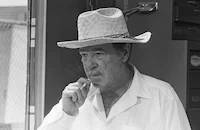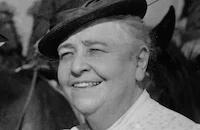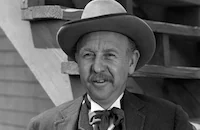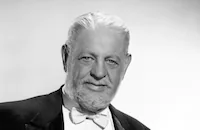The Great Gildersleeve

Brief Synopsis
Cast & Crew
Gordon Douglas
Harold Peary
Jane Darwell
Nancy Gates
Charles Arnt
Freddie Mercer
Film Details
Technical Specs

Synopsis
Amelia Hooker, a spinster with matrimonial designs on Throckmorton P. Gildersleeve, hints that her brother, Judge Horace Hooker, may deny Gildersleeve's petition for legal guardianship of his niece Margie and nephew LeRoy unless he marries. When Gildersleeve replies that he plans to install a woman in the house, Amelia thinks that he is planning to propose to her. Gildersleeve's idea of a woman in the house, however, is to recruit the children's aunt Emma to come and live with the family. As he prepares to drive to the Summerfield train station to meet Emma, Gildersleeve discovers that his car is out of gas, and so he drives LeRoy's scooter with sidecar instead. When the sidecar derails with Aunt Emma in it, her watch is destroyed in the resulting crash. While Gildersleeve is replacing the watch at jeweler's, Amelia's friends see him and, assuming that he is buying an engagement ring, call to offer Amelia their congratulations. That night, a messenger delivers a love letter from Amelia to Gildersleeve, prompting the panicked bachelor to visit the Hooker house the next morning to deny any matrimonial intent. After the judge angrily gives him ten days to marry or lose custody of his niece and nephew, Gildersleeve reluctantly considers courting Amelia. Deploring the idea of Amelia becoming their "mother," LeRoy and Margie scheme to make their uncle the most important man in town in order to intimidate Judge Hooker. As LeRoy prints handbills touting Gildersleeve's greatness, Margie leads brass bands in salute of him. When Governor John Stafford's car breaks down in Summerfield, the governor meets LeRoy as he is posting the handbills. The governor, who is traveling incognito because he wants a rest, introduces himself as Mr. Smith. Discovering that the governor is suffering from a bad cold, LeRoy invites him home to try Aunt Emma's cold cure. At the Gildersleeve house, Aunt Emma puts the ailing governor to bed. When Gildersleeve is told about their house guest, he becomes angry until Margie, who has learned their visitor's true identity from his chauffeur, informs her uncle of the governor's ruse. Athough the governor pleads with the family to keep his identity a secret, Gildersleeve immediately goes to his country club and brags that the governor is his guest. To verify Gildersleeve's story, Mayor Appleton calls the governor's office, and when his secretary transfers the call to the "governor," the mayor and the others think that Gildersleeve is lying and decide to teach him a lesson. Judge Hooker invites Gilversleeve and the governor to a luncheon at the club the next day, and when the guest of honor arrives, the club members use a trick microphone to squirt water in his face and send electric shocks to his chair. Indignant, the governor is about to leave when Mayor Appleton arrives and recognizes him. Thoroughly humiliated, Judge Hooker goes home to pack his possessions and leave town. As the judge packs his trunk, Gildersleeve and Governor Stafford drive to his house, and after the governor forgives the judge's antics, Gildersleeve and Judge Hooker reconcile.

Director

Gordon Douglas
Cast

Harold Peary

Jane Darwell

Nancy Gates

Charles Arnt

Freddie Mercer

Thurston Hall
Lillian Randolph
Mary Field
George Carleton
George Chandler

Fern Emmett
Anne O'neal
Herbert Vigran
John Dilson
Loren Raker

Lee Phelps
Syd Saylor
Don Kerr
Clark Morgan
Broderick O'farrell

Russell Wade
Bruce Edwards
Crew
C. Bakaleinikoff
John L. Cass
Albert S. D'agostino
William Dorfman
Al Fields
Julien Josephson
Walter E. Keller
John Lockert
Frank Redman
Herman Schlom
Darrell Silvera
Jack Townley
Vernon L. Walker

Videos
Movie Clip



Hosted Intro
Film Details
Technical Specs

Articles
The Great Gildersleeve -
By Frank Miller

The Great Gildersleeve -
Quotes
Trivia
This was the first of four feature films based on Harold Peary's popular radio character "The Great Gildersleeve". The next two features would be released later the same year, and the fourth released the following year (1944).
Notes
According to a news item in Hollywood Reporter, RKO borrowed director Gordon Douglas from Hal Roach for this film, which led to his term contract at the studio. This was the first film in RKO's "Great Gildersleeve" series. The series, which ran from 1942-44, consisted of four films, all featuring the adventures of Throckmorton P. Gildersleeve, who was portrayed by Harold Peary. All four were produced by Herman Schlom, directed by Gordon Douglas and featured Freddie Mercer as Gildersleeve's nephew "LeRoy" and Lillian Randolph as the maid "Birdie." Nancy Gates appeared as Gildersleeve's niece "Margie" in the first two films, but was replaced first by Margaret Landry, then by Margie Stewart. The film series was based on The Great Gildersleeve radio series, which was broadcast on the NBC radio network from August 31, 1941 -50. Lillian Randolph also played "Birdie" on the radio, and Richard LeGrand played "Peavy, the druggist," a character he reprised for the last three Gildersleeve films. The radio series was a spin-off of the Fibber McGee and Molly show. In 1955, the NBC television network syndicated the series for television. The television series featured Willard Waterman and Roland Keith. Lillian Randolph reprised her role as "Birdie" for the television production. For additional titles in the series, consult the Series Index.















